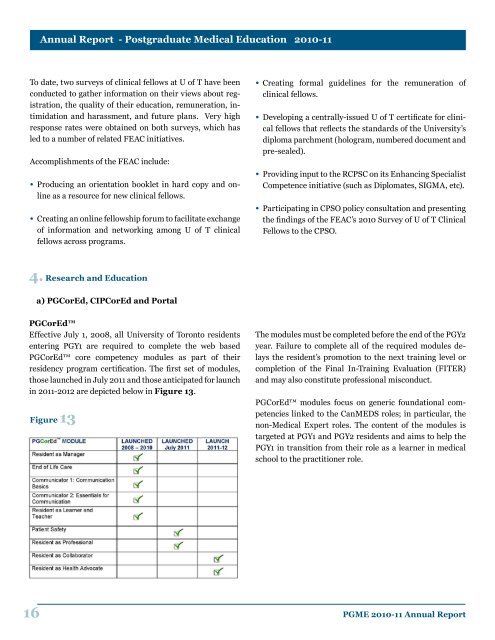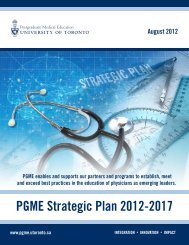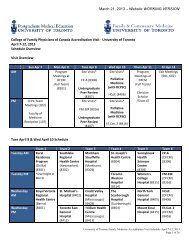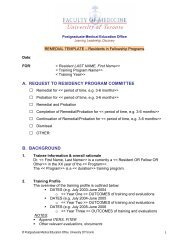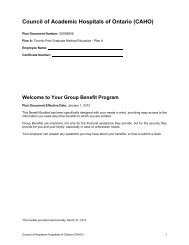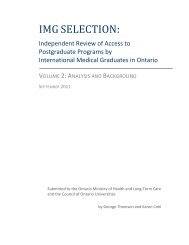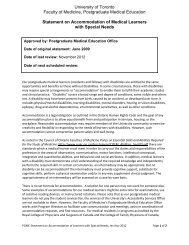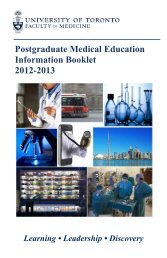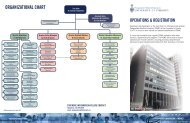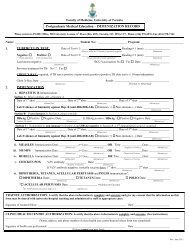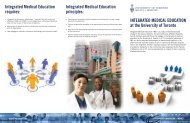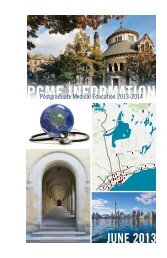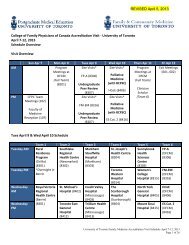PGME Annual Report 2011 - Post Graduate Medical Education ...
PGME Annual Report 2011 - Post Graduate Medical Education ...
PGME Annual Report 2011 - Post Graduate Medical Education ...
Create successful ePaper yourself
Turn your PDF publications into a flip-book with our unique Google optimized e-Paper software.
<strong>Annual</strong> <strong>Report</strong> - <strong>Post</strong>graduate <strong>Medical</strong> <strong>Education</strong> 2010-11<br />
To date, two surveys of clinical fellows at U of T have been<br />
conducted to gather information on their views about registration,<br />
the quality of their education, remuneration, intimidation<br />
and harassment, and future plans. Very high<br />
response rates were obtained on both surveys, which has<br />
led to a number of related FEAC initiatives.<br />
Accomplishments of the FEAC include:<br />
• Producing an orientation booklet in hard copy and online<br />
as a resource for new clinical fellows.<br />
• Creating an online fellowship forum to facilitate exchange<br />
of information and networking among U of T clinical<br />
fellows across programs.<br />
• Creating formal guidelines for the remuneration of<br />
clinical fellows.<br />
• Developing a centrally-issued U of T certificate for clinical<br />
fellows that reflects the standards of the University’s<br />
diploma parchment (hologram, numbered document and<br />
pre-sealed).<br />
• Providing input to the RCPSC on its Enhancing Specialist<br />
Competence initiative (such as Diplomates, SIGMA, etc).<br />
• Participating in CPSO policy consultation and presenting<br />
the findings of the FEAC’s 2010 Survey of U of T Clinical<br />
Fellows to the CPSO.<br />
4. Research and <strong>Education</strong><br />
a) PGCorEd, CIPCorEd and Portal<br />
PGCorEd<br />
Effective July 1, 2008, all University of Toronto residents<br />
entering PGY1 are required to complete the web based<br />
PGCorEd core competency modules as part of their<br />
residency program certification. The first set of modules,<br />
those launched in July <strong>2011</strong> and those anticipated for launch<br />
in <strong>2011</strong>-2012 are depicted below in Figure 13.<br />
Figure 13<br />
The modules must be completed before the end of the PGY2<br />
year. Failure to complete all of the required modules delays<br />
the resident’s promotion to the next training level or<br />
completion of the Final In-Training Evaluation (FITER)<br />
and may also constitute professional misconduct.<br />
PGCorEd modules focus on generic foundational competencies<br />
linked to the CanMEDS roles; in particular, the<br />
non-<strong>Medical</strong> Expert roles. The content of the modules is<br />
targeted at PGY1 and PGY2 residents and aims to help the<br />
PGY1 in transition from their role as a learner in medical<br />
school to the practitioner role.<br />
16 <strong>PGME</strong> 2010-11 <strong>Annual</strong> <strong>Report</strong>


